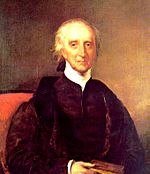Wikijunior:American Founding Fathers/Charles Carroll

Who is this?
[edit | edit source]Charles Carroll of Carrollton
What did he do that made him important?
[edit | edit source]Charles Carroll (1737–1832) was a signer of the Declaration of Independence. He was the signer of the document who lived the longest. He was also the only signer who was Roman Catholic.
Carroll was a critic of the British policies to the Colonies. He said it was up to the colonies to whether they should be taxed or not. He wrote in the Maryland Gazette and protested the Governor's actions. From 1774 to 1776, Carroll was a member of the Annapolis Convention. He was commissioned with Benjamin Franklin, Samuel Chase and his cousin John Carroll in February 1774 to ask Canada to become the 14th colony. He was a member of Annapolis' first Committee of Safety in 1775. In early 1776, while not yet a member, the Congress sent him on a mission to Canada. When Maryland decided to support the open revolution, he was elected to the Continental Congress on July 4, 1776, and remained a delegate until 1778. He arrived too late to vote in favor of it, but was able to sign the Declaration of Independence.
Carroll returned to Maryland in 1778 to assist in the drafting of a constitution and forming a state government. Carroll was re-elected to the Continental Congress in 1780, but he declined. He was elected to the state senate in 1781 and served there continuously until 1800. When the United States government was created, the Maryland legislature elected him to the first United States Senate. In 1792 Maryland passed a law that prohibited any man from serving in the State and national legislatures at the same time. Since he preferred to be in the Maryland Senate, he resigned from the U. S. Senate on November 30, 1792. He retired from Public life in 1801.
What did he do when he was young?
[edit | edit source]What did he do afterward?
[edit | edit source]Charles Carroll lived for over fifty years after the signing of the Declaration of Independence. In his later years, he returned to life as a plantation owner. Late in life, he was one of the founders of the Baltimore and Ohio Railroad. He died in 1832 at the age of 95.